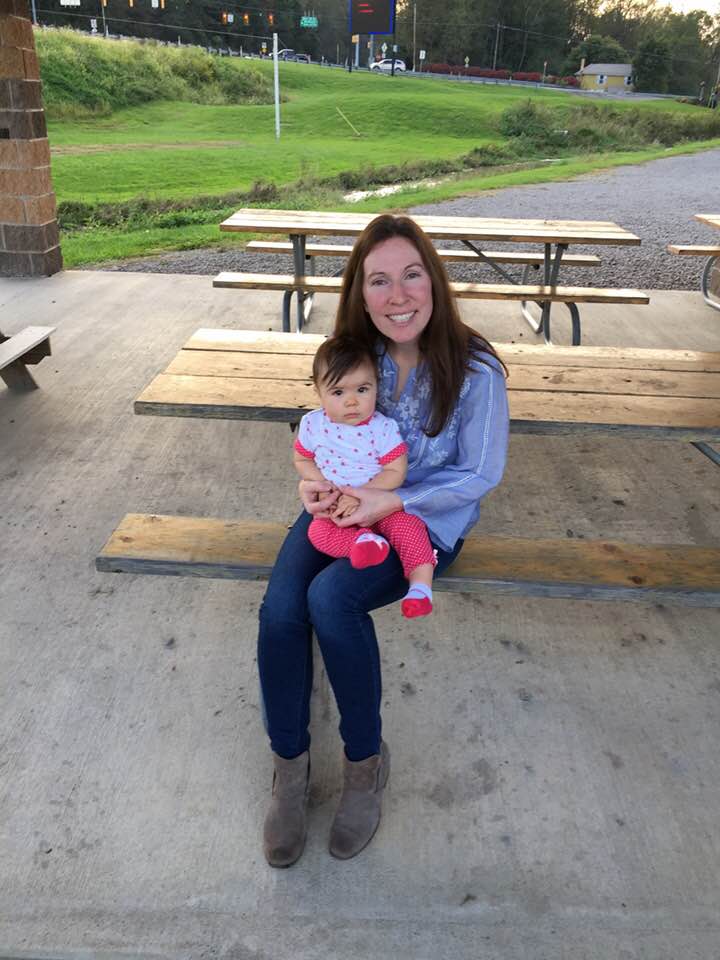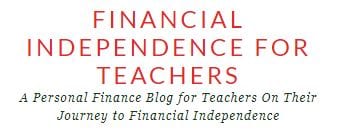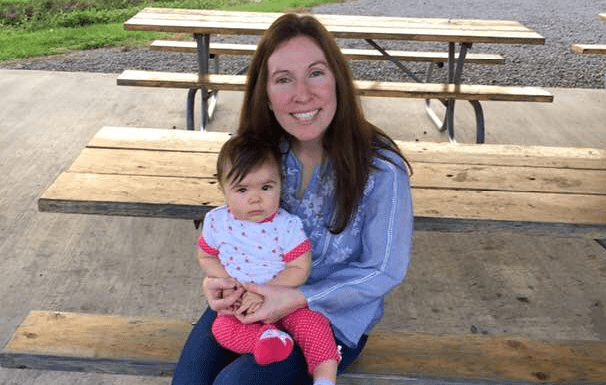This week we are excited to share another story from a Young Debt-Free Family. Kate from Financial Independence for Teachers joins us to share her family’s story about becoming debt free while raising four children.
What I really love about Kate’s story is the balance they appear to have in their lives. Kate and her husband, Jeff, work regular jobs (teacher and engineer) and by being intentional have been able to accumulate a net worth of about one million dollars all while being able to get their four children off the bus every day. They’ve been able to accomplish their financial goals even when having multiple children in day care at the same time.
I especially enjoyed reading about the money lessons they are sharing with their children. For example, Kate discusses an example of the perception their children have about a “rich” neighbor with a huge house. We’ve probably all made these assumptions in the past. In reality it’s often the people with the big homes and expensive cars that are living paycheck-to-paycheck, while there are many others who live modestly on the outside yet a rich and fulfilling life behind the scenes.
I’m really excited to feature Kate’s story and hope you enjoy it as much as I did! I love Kate’s mission to help teachers achieve financial independence, especially since my other half is also a middle school teacher.
Young Debt-Free Families Interview with Kate from Financial Independence for Teachers

1) Start by telling us about yourself. Please include any details you feel comfortable sharing about your family, job situation, income level, and amount of debt paid.
My name is Kate, and I’m a middle school Spanish teacher. I’ve been teaching for over 15 years, and while my job is stressful at times and much different from when I first started teaching all the way back in 2003, I still love what I do.
My husband Jeff is a Civil Engineer. He’s been working at the same company for 18 years. We are both frugal by nature and most people would describe us as “go-getters”. We both grew up in humble families and we learned from our parents that, “the borrower is always a slave to the lender”.
While I was incredibly lucky to escape college without school loans by earning scholarships, working as many as three part-time jobs at a time, and with my parents’ financial assistance, my husband had to pay for his own education.
We both started working at age fifteen and have always had big dreams. We understand the weight that debt can have on your shoulders, so we’ve always tried to live below our means in order to ensure we could survive future financial hardships.
My husband and I met during my first year teaching when I was making only $30,000 as a first year teacher living six hours from “home” in the eastern part of Pennsylvania near Harrisburg. During that first year I rented a tiny one bedroom apartment and only lived a couple of miles from work. Although I wasn’t making much money at the time my financially savvy father convinced me to start contributing to a 401k program that first year.
Meanwhile, my husband was living at home in order to pay off his college loans as quickly as possible in order to get out from under his $20,000 college loan debt. While he wasn’t making much more than I was back then, he was also contributing to his own personal retirement account while stashing away as much money as possible in order to purchase a beautiful piece of property that he heard would soon be for sale.
In 2003 we became friends and slowly started dating. Soon after, I took a higher paying job to move “back home” in order to be closer to my family. When I moved home I lived with my parents for a few months and commuted the 45 minutes each way to work for a few months before realizing I was so much happier in my own space.
Check out all of our Young Debt-Free Family Interviews!
Because I had always worked, I had enough money saved up to put 20% down on a sweet little white and blue house much closer to my new job. I was so proud of that little house and enjoyed everything about home ownership from cutting my own grass to scraping wallpaper, laying tile, and repainting the walls and ceilings. It was wonderful being able to spend time with my family and to have a place of my own!
My second year teaching I made $37,000 and was constantly busy between teaching all levels I-IV of Spanish and a test-prep class while helping to coach cross country. My soon-to-be husband and I got closer that year, even though it meant having a long-distance relationship.
I taught in the same school district for two years, struggling to find the time to balance everything on my plate on top of the required classes I would need to earn my permanent teaching certificate. There were rumors starting that year about merging two schools, which meant that I would be traveling between two buildings and still teaching multiple levels. Even though I had only been teaching for three years, I was starting to realize that it would be difficult to have a family and continue to balance so many teaching responsibilities at once.
While I hadn’t started seeking out a new job, I’ll never forget the day that Jeff called to tell me about a Spanish Teacher job opening in the premier school district near where his family lived. By then he had purchased over 100 acres just down the road from his parents’ house, and I knew he wouldn’t be leaving his hometown any time soon. If our relationship was going to work, I would have to be the one to move away from my family.
He tried to explain that securing a teaching job in this school district would be like winning the lottery, even pulling up the teacher’s salary schedule and benefit package to woo me with their salary and benefit package.
I had to admit, working in this school district did seem like it would be a dream job for any teacher.
Related Post: If you are a young family looking to improve your finances, check out our roadmap to building generational wealth!
While I was pretty happy with my present situation, Jeff was able to convince me to apply and to see what would happen next.
The short version of this long story is that I got hired, had a very difficult time deciding what to do, but ultimately sold my sweet little house (with a nice profit), and moved to an apartment to start the new school year in a new lesser stress position teaching only two levels of Spanish with a $10,000 raise.
I despised living in that drab brown apartment and as soon as spring hit I bought a new house in the country where I could run and bike for miles. Shortly after, Jeff proposed and we started our lives together in my second “little house”.
It was a tiny little house at just over 1,100 square feet and a crawl space for a basement. While living in this affordable little place allowed us to afford to pay off “our property” within five years of my husband buying it while balancing daycare for one, then two children, but we knew that eventually it would be time to move.
We lucked out and sold our little brown country house for approximately $35,000 more than when I bought it, and with the extra money I made from the sale of the first and second homes we were able to pay off the land and put 20% down on the house where we live today with all four of our children.

Our “new to us house” is a 1970’s cedar contemporary home that while solid, needed a complete refresh. I still don’t know how we survived all the work that we put into the house while raising a toddler and a new baby, but we did and our home is now worth quite a bit more than the $137,000 that we paid in 2012.
Over the years I’ve continued taking classes in order to climb my salary schedule as quickly as possible.
I now have a Masters Degree plus 60 additional credits, which means that I am at the top of my school district’s salary schedule. This means that I make approximately $10,000 more than most of the teachers at my school who have not reached this level of education.
This money has helped us to pay for up to three children in daycare at a time since we have had to pay for full child care completely on our own since my husband’s mother still works and my family is too far away to help with childcare. Despite the seemingly unending childcare bills we have experienced over the last decade, we have still managed to save and invest money by living frugally. We drive used vehicles, live in a low taxed area, rarely eat out, and are always aware of our spending.
Check out our review of Dave Ramsey’s Financial Peace University
We have tried to optimize our lives by looking closer at the things that we can do to make our lives as enjoyable as possible while sticking to a budget.
When we had three children in daycare and I was feeling very burned out from teaching I realized that I was eligible for two seven month sabbaticals from work. During this time we didn’t have to pay the $2,000 a month we had been paying for daycare, so it made sense for me to take a break from working.
During this time we traveled to Walt Disney World twice and made some incredible memories with our young children. We also worked on renovating our house, I trained for and ran a half-marathon, started a photography company, and took six graduate level classes to help me get to the top of my salary schedule two years earlier than if I had still been working.
Raising four kids on any income can be challenging, but with only one child left in daycare, and early morning care to get the older three kids on the bus, we finally feel like things are starting to fall into place and we are able to do more with our money.
Along the way we have just kept moving forward. We have continued to invest in our own individual retirement funds while paying 7% a piece into our individual pension programs. We have been investing in a college savings plan for all four children since their birth and hope to be able to cover each child’s full in-state tuition if they decide to go to college. Additionally, We have been paying extra on our home since we first purchased it almost eight years ago, and we are planning to pay it off by the start to summer at the very latest.
We now own over 100 acres just down the road from our house as well as three additional parcels of land. With the money that we have invested in our individual pension plans and with the value of our assets and investments we estimate that our combined net worth is around $1,000,000. We are 38 and 40 years old.
While some people would consider us to be “financially independent” already, we don’t consider ourselves to be there yet. We still have big dreams for ourselves and for our family and we know that some of the most expensive years are still to come.
We recognize that both of us are incredibly lucky to have jobs that provide us with valuable health care and benefits, and I’m supremely lucky to be able to get my kids off the bus at the end of the day and to be home for all the holidays and summer vacation, which helps me to feel positive about my job, too. When I begin to feel stressed at work I try to stay grounded by remembering all the incredible blessings my job has brought to our family and the difference I still feel like I’m making in my work.
2. What inspired you to payoff your debt? Did you have a specific moment where you decided to make it a goal to payoff your debt?
As mentioned before, we have always been people who want to do what is right. We view debt as something that holds you back and takes away your assets and we understand that there are no shortcuts to building wealth. Paying off our debt was never a question for us, it was just one of the stops along the vision we shared for our life.
3. How did you stay disciplined throughout the process to pay down your debt?
I’m not going to lie to you, raising children is hard. I used to think that maybe there was a “perfect number” of children to have and that maybe once you reached that point life would become easier. We now know that there is no perfect number or children or optimal time to accomplish your goals. The truth is, with more children it becomes harder and harder to meet your own personal goals, no matter what they are.
One of the things that my parents taught me growing up was the importance of writing down your goals and looking at that paper over and over again. This is something I’ve always done and the act of writing does seem to have helped bring my dreams to light. We were certainly also lucky to have my parents’ guidance because they too are an example of how frugal living and future planning can help you to live a successful life.
When people ask me how we were able to accomplish so much in such a short period of time I always say that we just kept going. On the hardest days we broke down tasks into the smallest steps and tried to just keep crossing off what needed to be done from our lists.

4. Were there any apps, tools, or websites that were especially helpful in paying down debt?
My husband has always been a planner. While I just started becoming more hands-on with our finances, he’s always been our money manager. He has tracked our net worth and assets via an old fashioned Excel spreadsheet since we’ve been married. As an engineer he’s wonderful at fixing and building things and his talents at fixing our cars, doing our taxes, and renovating our home have saved us tens of thousands of dollars during over the last eleven years of our marriage.
5. What advice would you provide to other young families who are overcome by the stresses of debt?
My advice to young families is to make a timeline of your life. It sounds like a silly thing to say, but the reality is that life goes by quickly and your “earning years” won’t last forever.
I would have them put a dot at their present ages and a dot somewhere between age 50 and 60, when they would like to ultimately retire. I’d have them add up all their debt by listing the money they owe from least to most and then have them plot out a plan on that time line so that they will be able to eventually drop their debt in order to begin their path towards financial freedom.
Many of the people who have a lot of debt have found success with cutting their expenses to the bone and maximizing their earnings. They could probably save the most by moving to a low cost apartment in a safe neighborhood or even moving into a family member’s basement to get the ball rolling.
It’s likely that they will need to take on side jobs as well, so I would try to mentor them on the best types of side hustles for people in their situation.
Dave Ramsey has a great way of eliminating debt that seems to help motivate people by paying off their smallest debts first and then using that money to “snowball” into the next highest debt until they have eventually paid it all off.
I would encourage them to learn as much as possible about money management by checking out Dave’s books from the library, and I would invite them to contact me any time they need motivation to keep on moving forward.
6. What was the most challenging part in your journey to becoming debt-free?
The hardest part for us has been paying for daycare for so many children at once. We were older when we first started having our children, so while it would have made more sense to spread them out more so that we would have only had two at a time in daycare, we ultimately were willing to pay the sacrifice to have a larger family while we still could.
Investing in daycare has definitely been the hardest part of being a parent for us. No one wants to pay for daycare, but when you don’t have any other options, you’re glad to have the service available.
We will have ultimately paid more for daycare (not even counting early morning care) than our house, and knowing how much time I missed from my children’s youngest years still makes me sad, but knowing that we spent so much time working to pay for that service is the part that makes me the most disappointed. If my husband would have been making more money back then I would have chosen to stay home with my children no questions asked, but that wasn’t an option for us, even with an affordable home, frugal living, and used vehicles.
It’s expensive to live today and unless your partner is making at least $75,000 a year, it becomes hard to live with only one income when you have a mortgage and other bills to pay. Life is just a lot more expensive than it was when our grandparents and even parents were staying home with their children.

7. How has becoming debt-free changed your family’s life? How do you expect it will impact your family’s life going forward?
Isn’t it funny what kids think? A family is building a huge house right next door to ours that is going to be beautiful once it’s done. The people building the house are teachers just like me and yet my children are convinced that they are rich, even though I have explained that we make about the same amount of money.
We have talked to them about how “the cover isn’t always the book” when it comes to people’s finances, but they still just don’t get it. They ask why we can’t have a brand new house like them if we have the same amount of money coming in and while we’ll just keep explaining that our money is going to the future as part of a way for us to retire some day and to help them pay for college, they have been taught by the media and their peers about the importance of living for the present.
Our children know that we will be able to pay off our house soon, but we have also talked to them about how there is still work to be done. While it will be nice to decide how our extra money will be invested, I don’t expect that our day to day lives will change that much.
I’ll still keep buying all our clothing on sale, sticking to a grocery budget and shopping at Aldi, using our credit card reward points to pay for our trips, and yelling at the kids to turn off the lights when they leave a room.
Check out this post to learn more about Aldi
The only thing that will hopefully change at some point is that we’ll be able to get my husband an updated car. The kids are so embarrassed when they have to drive in his 2005 Honda Civic with the peeling off paint and mismatched rear bumper! While they would love a brand new car they are ok with a newish vehicle as long as it doesn’t look like it came from the dump!
8. What are future plans for your family after becoming debt free?
We know that college is expensive, so we plan to allocate the extra mortgage money into a combination of our children’s college savings accounts, our individual retirement accounts, and index funds. We would eventually like to purchase some rental properties, but this will need to wait for a little while until we build up enough money to afford either a 20% downpayment on top of our emergency fund or money to purchase a lower-priced home outright.
9. Are you pursuing (or have you reached) financial independence?
We have a very realistic understanding of what we need to do to ensure the rest of our lives and the lives of our children are successful. While it sounds great to just “retire” now with our million dollars, we know that our assets wouldn’t be able to withstand a market crash and raising four children since we are continuing to head into another “most expensive stage of life”.
We want to be able to help our children to have a good start to their adulthood by helping them to pay for college and providing them with a place to live at home, car insurance, and money for whatever other help they need so that they can focus on finishing college with good grades. The sacrifice we will need to make by working a few more years is worth it as long as I continue to remain in good health.
At some point we will be ready to either make a career shift or to retire from work completely and we hope that by setting our investments to autopilot that the money we will need in retirement will be there when the time is right.
10. Is there anything that you haven’t yet covered that you’d like to share?
The only thing that I didn’t really discuss is the importance of looking ahead to your longer term future goals and discussing what you can do today to help get to where you want to be. I feel so incredibly lucky to have had a chance to take two seven month sabbaticals from teaching and I’ll be eligible to take another set in three years.
You better believe that as long as my school district approves my application that I’ll take advantage of this extra time with my children, parents, and other family members. Now that our children are older, we’ll travel together before it’s too late and hopefully open their eyes to the world. Because I know this event is on the horizon we have already started making plans to finance this opportunity so that when it’s time we aren’t surprised by how quickly the date arrived. By talking about your vision for the future and taking action, you’ll be able to enjoy the most exciting parts of life.
11. Where can we learn more about your story?
I’ve just recently learned how to blog, but I am hooked! You can read more about me from my about page and more about our family’s journey to financial independence at www.financialindependenceforteachers.com and how you can prepare to take a career break at www.sabbaticalfromwork.com.
Thanks again to Kate from Financial Independence for Teachers for being willing to share her family’s story. If you are a debt free family and would like to share your story please reach out to us as we’d love to hear from you. Thanks for reading!

Mark is the founder of Financial Pilgrimage, a blog dedicated to helping young families pay down debt and live financially free. Mark has a Bachelor’s degree in financial management and a Master’s degree in economics and finance. He is a husband of one and father of two and calls St. Louis, MO, home. He also loves playing in old man baseball leagues, working out, and being anywhere near the water. Mark has been featured in Yahoo! Finance, NerdWallet, and the Plutus Awards Showcase.

